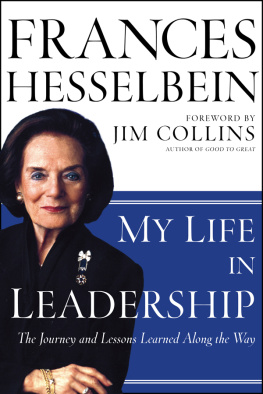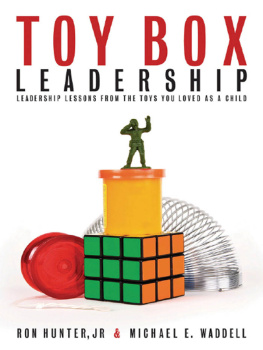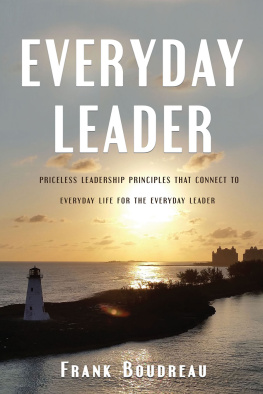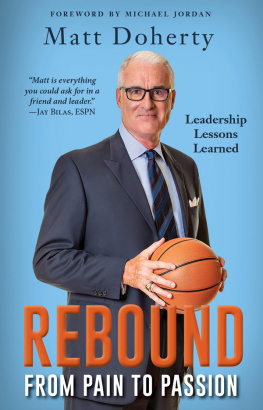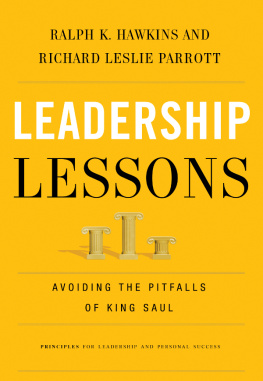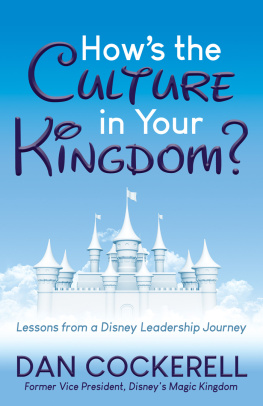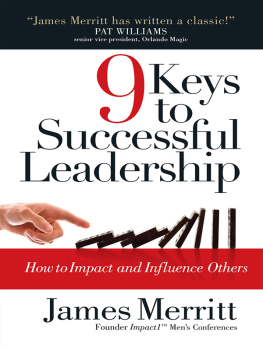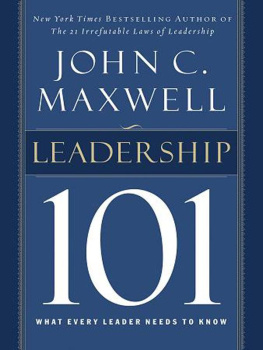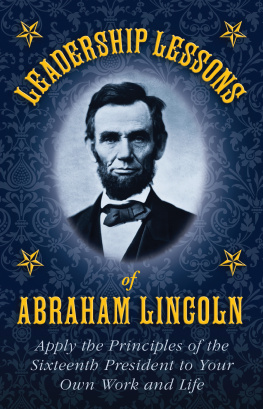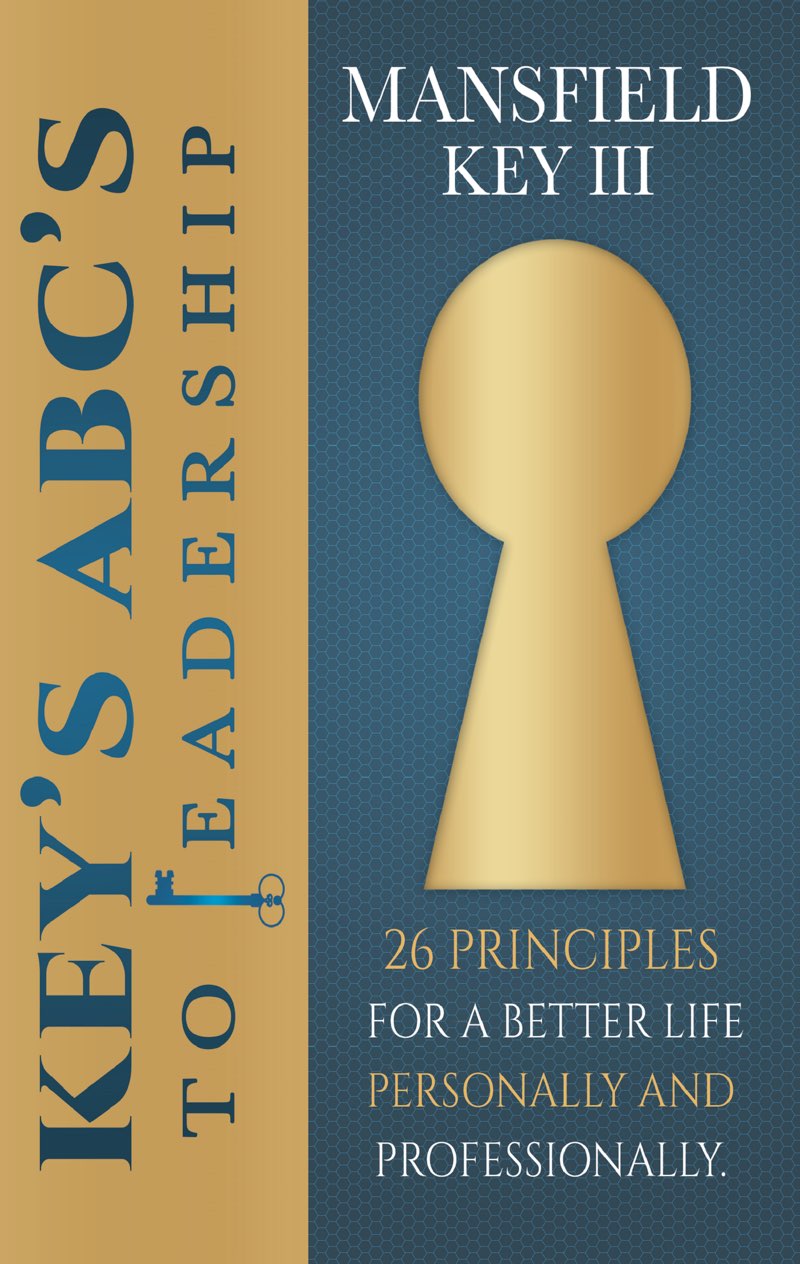KEYS ABCS to LEADERSHIP
26 principles for a better life personally and professionally
Mansfield Key, III
Copyright 2014 by Mansfield Key III.
All Rights Reserved.
Without prior permission in writing from the publisher, no portion of this publication may be reproduced, stored in retrieval system, or
transmitted in any form by any means, electronic or mechanical, including photocopying, recording, or by any other information storage and retrieval system, except for brief quotations in printed reviews.
Library of Congress
This book was derived from a workshop for leaders that was originally titled: Putting the Pieces Together
Cover layout and Book Designed by Ultimate Graphix
Every good work requires the effort of a group of individuals. This project is no exception to the rule.
This book is dedicated to all the great writers in my family my mother, Shirley Key, and my grandmother, Geneive, and my Great Grandfather, Stroke Pappa Dorth. They all passed away before they got to write their books. I thank them for their gifts, and I hope that I am able to pass on the wisdom that they gave to me.
To my wife, Sharlene, who has been my friend, my love, and my biggest supporter since middle school. To my daughters, Erin and Joi, for their understanding and patience when I was up working until 3:00 AM. To my brothers, Roderick and Derric Tank Key, for believing that their brother could write more than just rap songs. Special thanks to my Dad, Mansfield Key, Jr., the most avid reader I know. Thank you, Pop, for helping to mold me into the man I am today.
I dedicate this to the teams of people who allowed me to lead them while I was still learning the leadership principles that I share in this book. Special thanks to Anthony AB Brooks for putting the finishing touches on what I thought was complete. To the dream team of Latasha Howell, Lois Jackson, Dede Simmons, Dr. D. Peterson, Sarah Deuoron Perry, James Edwards, and Tangela Butler words cant express my gratitude. Thanks to Jeremy Anderson for giving me guidance in the world of publishing. Thanks to my mentors, Dr. Rozario Slack, TJ Johnson, and Bishop David Richey. And many thanks to the behind the scenes team of Sepia Gladden, Bishop Eddie Long, Pastor Brady and Vickie Butler, Pastor Margaret Richey, Anthony Toney Jordan, Terrell Brown, Mrs. Stockard, Billy Ray Casteel, Dr. Jimmy Shaw, Eugene Saks, Roderick Shepphard, Joyce Greene, Pastor Aota Acts and my Grace Chapel Family of Johannesburg, South Africa, Michelle Dawes-Birt, Angela Sheppard-Smalls, Patricia Bridget Watts, and Barbara Jackson, and many others.
As an author whose teacher used to refer to him as the kid that couldnt read, I dedicate this to the students, and to anyone who ever believed that they couldnt succeed because someone once told them that they didnt have what it takes.
I dedicate this to all the things that you will do to defy the odds.
Contents
Introduction
If we could change ourselves, the tendencies in the world would also change. As a man changes his own nature, so does the attitude of the world change towards him...
We need not wait to see what others do.
Mahatma Gandhi
What is a leader? The dictionary says that a leader is: a person who leads or commands a group, organization, or country; a guiding or directing head, as of an army, movement, or political group. Dr. Myles Monroe describes leadership as a persons capacity to influence others through inspiration motivated by a passion, generated by a vision, produced by a conviction, ignited by a purpose. Some leaders say that leadership is pure influence. Others say that the ultimate leader is a servant.
There are leaders who serve, and leaders who want to be served. There are leaders who have a title and a position, but have no real influence outside of the title. And then there are leaders who dont have the title or position, but possess a power to lead through their capacity to truly impact and influence others. Some have a natural gift and talent for leadership, and their ability positions them to lead. And some are placed into a leadership position and then given the opportunities to develop leadership skills. And still others are driven to lead by necessity, accepting responsibility and stepping up to the plate when no one else will.
Weak leaders with a strong vision can do more good than strong leaders with no vision. If a leader has no vision, then he has nowhere to lead people, no matter how strong his influence or charisma may be. Even if someone doesnt possess all the skills and qualities of an effective leader, their commitment to a vision allows them to attract what they dont yet have.
I say that the most essential defining characteristic of a leader is a strong commitment to personal and professional growth. Through a commitment to growth, all of the key skills and characteristics of a leader can be cultivated and acquired.
Are you a leader? How do you know that youre a leader? Who told you that you were a leader? Did getting a position and a title make you a leader, or was it a deeper cultivation of the skills that it takes to lead? Did becoming a parent give you the skills and knowledge to wisely guide your child? Did becoming a teacher equip you with the skills to lead a classroom? Before you ever lead anyone else, you have to remember that the hardest person to lead is yourself. The question is: who and what are you allowing to influence and lead you?
Prologue
My Personal Path to Leadership
My name is Mansfield Key III, and I am a leader. I never asked to be a leader. I didnt win an election or give a speech to my peers and ask their permission to be their leader. I never completed an application or took a training for the job of leader. So how did I become a leader? I became a leader when someone told me that I was one and I chose to step up to the plate.
It was during the Christmas Holidays when I was in seventh grade that five of us guys on the basketball team decided to skip practice. As a consequence, our coach told us that wed each have to sit out a game, and he would decide which one. One of the guys, the group ringleader, convinced all of us that we should quit the team instead of accepting coachs punishment. The idea was that if we refused the punishment and quit the team, then coach would only have five players left. Since that wasnt a full team, we thought hed be forced to let us stay.
By the time we got back to school, the word was out that five guys might quit the team. One person on the team was about to decide the fate of all the rest. It was the last period of the day and we were getting ready for practice. Coach asked, Do you guys understand why you have to sit out a game? We all said, Yes, Coach, we understand. Coach asked if any of us had anything to say. I said, Yes, Coach. I want to tell you Im sorry I disobeyed the rules and Im willing to accept any punishment. Thank you for letting me stay on the team. Everyone looked at me funny, and then my best friend said, Coach, I want to say Im sorry I didnt show up to practice. Eventually, everyone apologized and stayed on the team, including the ringleader.
After that incident, my classmates and teammates started looking to me as a leader. Initially, we all went along with the ringleaders plan because he was a bully. We were scared of him. To the rest of the guys, it looked as if I had stood up to him, but that wasnt the whole truth. The truth was that my dad had told me that I had to apologize as soon as I saw the coach and accept whatever punishment came my way, or else I could look forward to a good whipping when I got home. My actions appeared bold to the guys, but when it came down to facing my dad, with all of his authority and power, versus a 120 pound seventh grader, there really wasnt a question as to whose directive I would follow.


